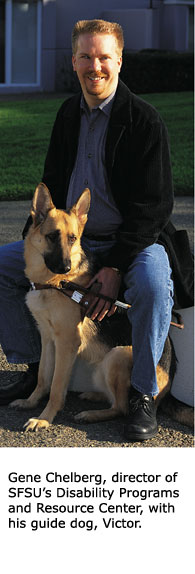Seeking
the all-access pass As
a busy administrator at San Francisco State, Gene Chelberg,
who is blind, uses various adaptive technologies. He makes appointments
with BrailleNote, a hand-held computer with braille output. A speech
synthesizer called JAWS reads out loud the text on his computer screen.
Talking caller ID tells him who is on the other end of the line. But Chelberg, director of the University's Disability Programs and Resource
Center, insists that these technologies do not help him overcome his
disability. Being blind, he says, is part of who he is and not a condition
he needs or wants to get past. "I talk about [blindness] in the same way I talk about myself being
a man, being Scandinavian or being gay," said Chelberg. "It's
only when you run into a barrier that it becomes a negative experience." At San Francisco State, Chelberg and his full-time staff of 13 work
to remove barriers so that people with disabilities can enjoy equal
access to campus life. "I'm out there every day going, 'Oookay.
What about access?' This has got to be part of every decision we make
at the University," Chelberg said. Chelberg came to San Francisco State two years ago from his alma mater,
the University of Minnesota, Twin Cities, where, as an undergraduate,
he helped establish the country's first cultural center for disabled
students. After graduating in 1992, Chelberg stayed on to become assistant director
for disability services and later ran a program for gay, lesbian, bisexual
and transgender members of the university community. He also holds an
executive master's of management and disability services from the University
of San Francisco. At San Francisco State, Chelberg gets a lot of what he wants by sheer
force of his ebullient personality. He is funny, quick-witted and doesn't
seem to take himself too seriously. But should his charm offensive fail,
Chelberg can always fall back on state and federal laws mandating access
and reasonable accommodation for people with disabilities. "If I need to, I can pull that out of my back pocket," he
said. "Not only should you do it because you think I'm a nice guy
and I need access, but in case you don't think I'm a nice guy, the velvet
hammer comes down." Beyond the legal obligation, Chelberg believes there's a moral imperative
to the accessibility issue. "As an institution of higher education, we have a responsibility
to be a leader in modeling how humanity embraces all of its parts,"
he said. "I know that sounds like some sort of platitude, but I
really believe it." Back to
Breaking Barriers 
| 


